What happens when your friends become your food
I spend quite a bit of time with our pigs. Although they are doing work for circleAcres, they could be considered my project. I move their fence and dumpster their food and make sure their house is in order. This isn’t to say that the other folks don’t help out with all this, but I am the primary contact with the three piggles.
I pull the lice out of their ears. That alone makes us pretty tight.
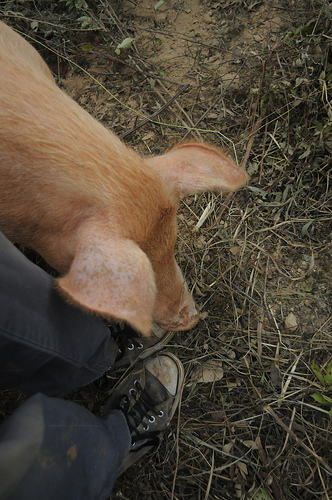
Kristin has become attached to them, giving them their nightly belly scratching and making sure they have enough of everything that they need. As I alluded to in a previous post, it is because of her view of the way these pigs live that she may be able to eat them when the time comes. She has been vegan/vegetarian for thirteen years, about half her life, so it is a step that has not been considered lightly or without questions.
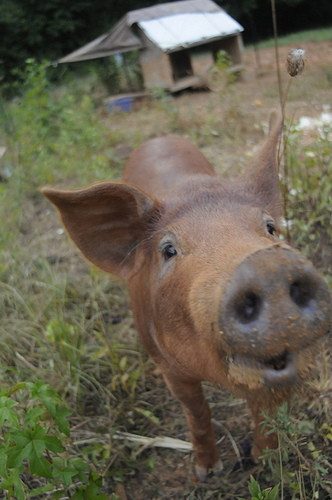
I spent some time as a vegan/vegetarian, some five years or so, but as the saying goes, “if you aren’t now then you never were”. Or maybe that is a straightedge thing. My reasons for that life were political and human based, focusing largely on the interactions of people in the food system. Animal rights and treatment were a close secondary consideration but not the major thrust for action. Living that life greatly informed my decision to eat entirely local and make a conscious decision every time I make a food purchase.
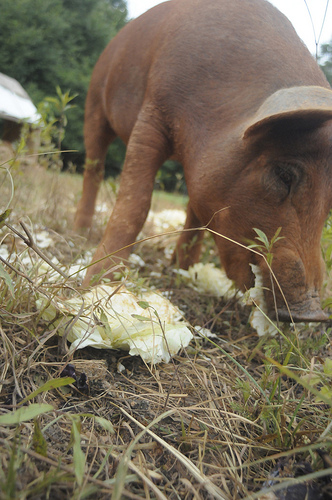
I have eaten meat for the last few years and, with very few exceptions, I know exactly where that meat comes from. I have to allow some exemptions (such as the weekly free lunch at a church in Pittsboro), but I have to have a pretty good reason and it has to be from a local restaurant or store.
But in a few months, all my pork will have come from a few hundred yards away.
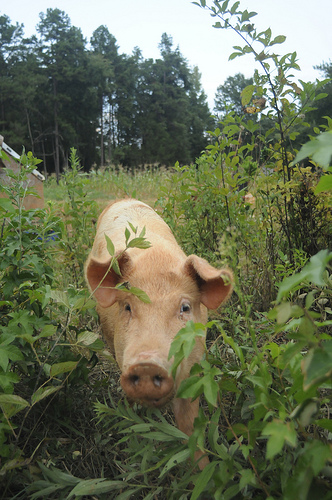
This brings up the issue of how to deal with ending the life of an animal who has shared your space and your time and your close interactions. I haven’t had to actually address the feelings before simply because this will be the first time I have raised an animal with the intent to eventually kill and eat it.
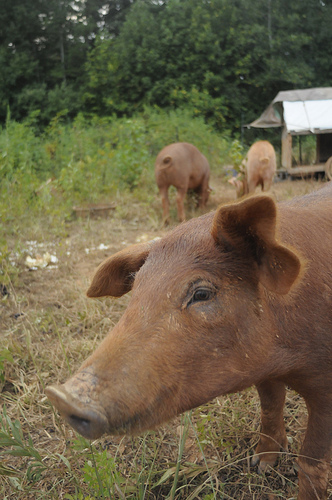
I can say that the best way to avoid any attachment is to treat the animal simply as a machine, a machine that needs to be checked on once in awhile in order to change the oil or put more fuel in the tank. This is how many farmers treat everything on their farm – human labor, soil, resources. Since I am trying to live a new example, I cannot get away with treating non-human farm residents as inferior or not worth any extra effort. They are not machines; none of the components around me is a machine although sometimes I fail to see that.
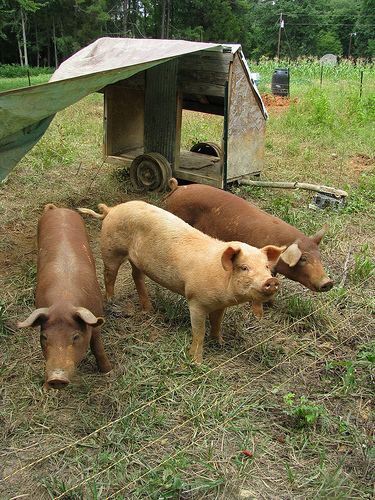
I need to know firsthand that I have created a space in which the pigs feel safe, cared for and unstressed and are able to fully enjoy being pigs. This means mud holes and tall grass, real dirt and kind words. It means that when it comes down to it there can be some sort of peace between the killer and the killed, that the sadness and harshness of the process of taking lives can be tempered in some way and that life up until the end can be human interpreted as “happy”.
Without trying to justify any action, we, as the users of this food, have to take responsibility for the actions needed to place a meat meal on our plates. We cannot do that unless we know where our food comes from.
August 17, 2009 at 3:09 pm
This is a great post, Trace. Thanks for taking the time to articulate the thoughts that I know many people share.
Looking forward to seeing y’all soon!
August 17, 2009 at 5:43 pm
I respect your efforts Trace. Looking forward to getting to read the commentary, if you choose to post one, after the meal; again if there is one….
August 17, 2009 at 7:34 pm
I imagine it will be a very long moment when you raise up whatever item you are planning to kill him or her with. You’re obviously not the typical person who raises animals for slaughter or slaughters them for a living. They have come to see the animal as a commodity, or at worst, a piece of living garbage to be dealt with (I would think it the only way to do this regularly). Their actions are not filtered through a thoughtful perspective and they can kill without questioning. Or maybe not; I don’t really know.
August 18, 2009 at 9:15 am
Hi Trace,
Enjoy your photography and commentary! And I appreciate the thought you have put into the dilemma of killing and consuming your piggie pals. That thought process alone sets you apart from the vast majority of animal farmers in the world. You are definitely to be commended for creating a lifestyle for your pigs that lets them express all their porcine sensibilities — their “pigness,” as Joel Salatin likes to say. The pictures of your co-laborers on your farm gives evidence of the healthy life you’ve provided for them.
Could I add another thought here (as a vegan)? I think the very fact that you care about the dilemma you’ve created (killing that which you have “created” and grown to care for) is evidence that harvesting animals for food is an unnatural act. It’s easy to grow to feel the same way about a pig as we do about a dog or cat. They all enjoy belly rubs and ear-scratches and demonstrate pure pleasure that a tomato plant or tractor can not. You are certainly accurate to conclude that farm animals aren’t machines. It’s why we don’t kill and eat our pet dogs while they do in other cultures. There is obvious a lot of cultural confusion about what to do with animals we grow to care about. I think your sensitivity to the needs and ultimate end of your pigs is evidence that something in you/us wants NOT to kill them and eat them.
That reality then begs the question, Why should we? There is nothing in animal flesh that we need for good health that is not available in plants (with the possible exception of vitamin B-12 which, if we didn’t sanitize and cook our field crops, we’d get plenty of from the naturally-occurring bacteria that produce B-12)—and much that we don’t need (saturated fat, cholesterol, etc.). Therefore, eating animal flesh ultimately boils down to appetite and economics: Meat (fat) has a taste humans grow to like, and raising animals free-range is perhaps economically motivating.
So if taste and economics are the two main reasons for eating animals, we’ve only complicated our dilemma: We have now elevated our taste and pocketbook as higher values than the existence and pleasure of other sentient beings. In other words, we have to say to our porkers (chickens, cows), “I don’t need to kill you in order to be healthy, but I’m going to kill you because you taste good and you’re worth more to me dead than alive.” Ouch! No wonder we feel conflicted about the act.
Please don’t take my thoughts as adversarial, Trace. As I’ve said, I commend you for the public and deliberate way you’re working through your relationship to the animals you’re raising. I hope other animal farmers will learn from your example and that your commentary will stimulate further helpful and healthy dialogue on what is, at best, a complicated issue.
Ultimately, of course, I wish the human race could learn to co-exist with the non-human species in a non-confrontational way. Idealistic, perhaps, but as a Bible reader I see that peaceful coexistence was the pattern in the beginning (Genesis 2:19-20) and will be in the coming peaceable kingdom (Isaiah 11:6-9). Both man and animals were apparently created to be vegan (Genesis 1:29-30), though that pattern has been maligned through the ages. But I still think it represents the ideal to strive for. Dilemmas are not always avoidable, but the original plant-based pattern for living allows us to avoid the self-imposed angst we feel about loving, then consuming, our non-human friends.
Thanks again for sharing your thoughts and providing a forum for feedback and discussion. Best wishes in all your endeavors and efforts to create a food “system” that is sustainable and satisfying to all its participants, human and non-human alike.
August 18, 2009 at 1:57 pm
William –
Thanks for the comments. One of the reasons I choose to eat meat, eggs and cheese again is that I was unable to meet my dietary needs with a local plant based diet. I tried not to eat fortified manufactured foods and my health suffered for it. During, but mostly after, my illness I became a “post-vegetarian food activist”, one of many that seem to populate my generation of anarchists.
I don’t feel that it is unnatural to live among non-human animals and eventually eat them. We enter a very symbiotic relationship of work and give and take that connects us among distinct seasons and other points of time.
I disagree on the statement about meat that it has “much that we don’t need (saturated fat, cholesterol, etc.)”. The human body uses fat and cholesterol for a reason, and I think the only reason humans have been able to colonize the bulk of the planet is because of access to non-plant sources of energy (be they insects, meat, milk or eggs). Urbanization has allowed for the ease of transitioning to a vegan diet, but I would wager that a collapse of civilization would erase that ease within months. Not that I think that will happen but it must be acknowledged.
August 18, 2009 at 2:14 pm
I am in awe.
I completely respect your ability to do this & have to say as a meat eater my whole life (although no pork for over a decade), I don’t think I would have the strength to eat one I have grown to love & who has learned to trust me. Good luck & I hope you realize how special you all are living this life. Inspiring… yet again.
August 21, 2009 at 4:10 pm
I just found your blog, and I appreciate it very much! In those beautiful pictures of your pigs you very well capture the dilemma of a sensitive carnivore. But isn’t it so that since we humans are so timid when facing our own mortality, we don’t want to be confronted by the fact that life, in order to go on, requires death? The more we are into prolonging our own lives by unnatural means, the less we want to know of death, not as it is in movies or computer games, but for real. I was 29 before I saw a dead person for the first time, and yet I don’t know if I could ever bring myself to kill an animal bigger than a mosquito. But I see it as the only way we have: to face and embrace death, life and rebirth, and accept our own weakness and mortality. Then we can perhaps try to go on with living on this planet Earth, a bit more in sync with it than we are now.
August 25, 2009 at 5:50 pm
I have thought and rethought whether to switch to a vegetarian or vegan diet and I’ve decided for the time being that my family would be well-served by reducing our meat intake to a few times a week (local and responsibly raised), but not eliminating it all together. As with a lot of of lifestyle changes, it is easier to achieve an 80 percent change than a 100 percent change (i.e. raw food diet or car-free lifestyle). Plus, I’ve read that soy — which many vegans rely on for protein — presents its own health and environmental problems.
By the way, I just wrote about NC farmers who have made the switch from CAFO to pastured pork, so people of all stripes and backgrounds are trying to make a difference:
http://www.news-record.com/blog/52580/entry/67616
September 3, 2009 at 9:53 am
Human selfishness never ceases to amaze me.
October 23, 2009 at 3:28 pm
I could never raise any animal with the intent of raising it for food….I’d rather eat tree bark.
Pingback: Switch To A Vegetarian Lifestyle. | 7Wins.eu
September 17, 2010 at 12:05 pm
Thanks to Trace for posting. And to William for articulating so beautifully.
i wonder now about Kristin….and whether she’s still a vegan.
September 17, 2010 at 12:12 pm
Janet:
No, she is not. She has been eating the pork since last December. We currently have three pigs that are nearing the end of their stay with us. I think the sadness is just as strong or stronger this year as it was last year, but this is how we have chosen to live. In order to do that we have to kill.
Trace
October 20, 2010 at 9:23 am
I just read this post–realize its a little out of date–however–I completely see your thought process on this. And I completely admire it. That said—I could never create that situation for myself. Oh my goodness!!! I already know I would be living with those three pigs in the house by the time Winter came. You are very brave–not so much for the killing part—but for setting up that situation–or is it an expirement?– in your life and to keep on with it. I keep saying I want a small farm down the line, so, maybe I’ll be stronger when that time comes. For now, I’ll just say WOW. And I would be interested to hear the End of the Story. Oh and also—your point about Veganism not being able to last the break down of society is so correct in my humble view. A deciding factor in my personal ethics–when terms of “natural” and “unnatural” come up, are along those lines. Not that I am expecting apocolpyse any time soon, but I do factor in that kind of questioning.